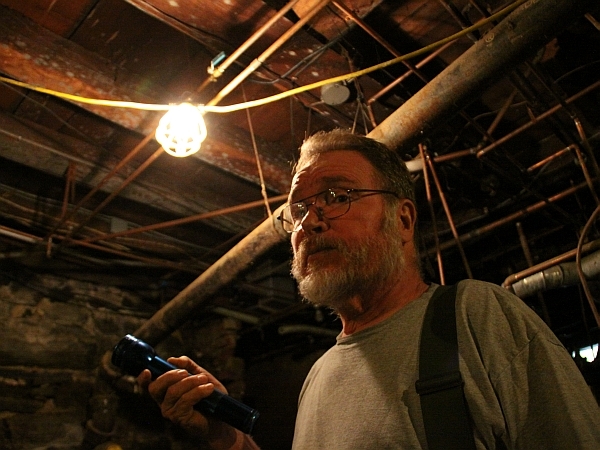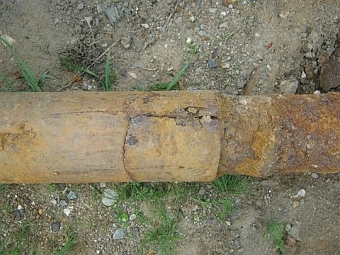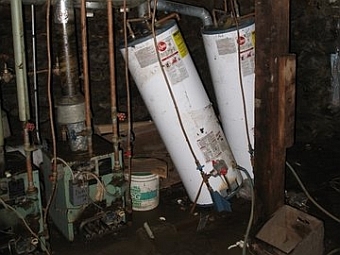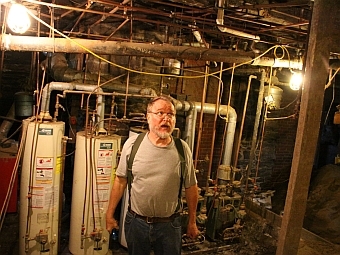
(Host) When a water pipe burst outside his historic apartment building in Springfield six months ago, Chris Coughlin’s cellar filled with water. Fuel oil spilled from heating tanks; the smell of it permeating the old, white apartment building near downtown. Now Coughlin says Springfield’s insurance carrier, the Vermont League of Cities and Towns, is at fault. VPR’s Kirk Carapezza visited Coughlin in Springfield, and filed this report.

(Carapezza) A large majority of the water ended up down here – in Chris Coughlin’s dark cellar. Fire officials estimate that it took less than a few hours for water to gush from a jungle-gym of old, underground cast iron pipes and inundate his basement.
(Coughlin) "It went up to a foot or so of the floor joist. Thankfully most of the electrical wiring is attached to the floor joist, so it didn’t’ get wet. But there were four breaker boxes over here. Those all were inundated."
(Carapezza) Heating oil tanks that didn’t have enough weight to hold themselves down were ripped from the ground and started to float.
(Coughlin) "They went flat against the ceiling. They then descended as they flooded and the oil that was in them, the residual oil, was ejected. And it covered the water."
(Carapezza) "It still smells like oil down here."
(Coughlin) "Yes, but it was suffocating when it first occurred."
(Carapezza) Coughlin says this all happened after Springfield increased its water pressure last fall to meet state mandates. He says the pipe that broke never should have been left under the street.
(Coughlin) "It obviously had never been pressure tested at the  levels that broke it at 90 pounds, because had they done that it never would have sustained the pressure."
levels that broke it at 90 pounds, because had they done that it never would have sustained the pressure."
(Carapezza) Now Coughlin is blaming the town’s insurance carrier, the Vermont League of Cities and Towns. Coughlin wants the League to pay at least $165,000 for repairs to his house.
He says the League should have warned the town that its pipes couldn’t handle increased pressure. He also says town officials shut down environmental clean-up two days after the burst – that they told him they couldn’t afford it. The town wouldn’t confirm that claim, and declined to speak on tape for this story.
Karen Horn of the League says she can’t comment directly either, but she admits the state’s resources for upgrading water systems are running dry.
(Horn) "Given the resources that we have and the money that’s come from the feds in recent years, the agency has done a really good job of putting together a priority system that addresses the highest needs first."
(Carapezza) Horn says everybody knows that pipeline issues like the one in Springfield are a major concern, and she wonders where towns will find the money to immediately address them.
(Horn) "What happens is that the towns have to come up with that funding on their own."
 (Carapezza) It’s a problem facing nearly every Vermont city and town. Springfield’s select board has raised its water rates by some 70 percent, in large part, to pay for upgrades. In Rutland, the mayor wants to create a capital plan to overhaul 30 miles of Civil War-era pipes.
(Carapezza) It’s a problem facing nearly every Vermont city and town. Springfield’s select board has raised its water rates by some 70 percent, in large part, to pay for upgrades. In Rutland, the mayor wants to create a capital plan to overhaul 30 miles of Civil War-era pipes.
Meanwhile, each day Chris Coughlin opens all his cellar windows, and turns on three big fans.
(Coughlin) "I’ve been pushing air through and hopefully some evaporation and natural drying is going on."
(Carapezza) For now, the large, white house sits empty. There are no tenants – just mold and mildew growing on its wooden beams, and mounds of dirt in basement.
For VPR News, I’m Kirk Carapezza.
Are you seeing an increase in the number of water main breaks in your town as Vermont’s water systems age and local government struggles to overhaul them? Who should be responsible for damages? Let us know in the comments section below.